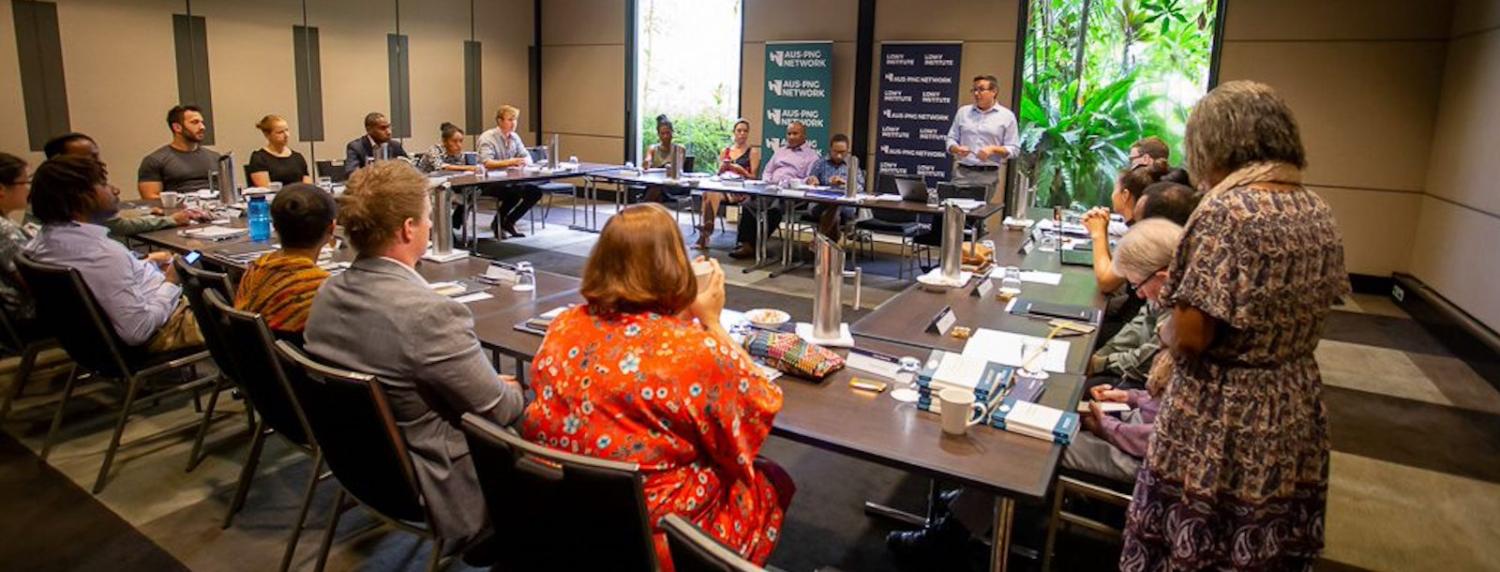Just a few kilometres separate Papua New Guinea and Australia at their closest point.
But when it comes to migration procedures, people on both sides of the Torres Strait can sometimes feel like the countries may as well be on separate planets. Visas remain a constant obstacle to building a stronger relationship between the two countries.
There’s a strong and growing awareness that a renewed focus on the Australia-PNG relationship at the government level is going to mean a greater role for the far north in cross-border ties.
Beyond stamps in passports, young leaders from both PNG and Australia say a more mature, multi-faceted relationship is possible through stronger people-to-people links beyond the traditional paths of aid and government relationships.
In December, 20 young leaders from PNG and Australia gathered in Cairns for the Lowy Institute’s annual Australia-PNG Emerging Leaders Dialogue.
Hosting the event in far north Queensland – the first time outside a capital city in the Dialogue’s six-year history – was a logical decision. A strong and visible PNG expat community attests to the close people links between the far north and PNG. Direct flights – sometimes three a day – and significant investment (in both directions) give Cairns a strong claim on being Australia’s PNG gateway.
There’s a strong and growing awareness that a renewed focus on the Australia-PNG relationship at the government level is going to mean a greater role for the far north in cross-border ties.
The dialogue benefitted from seeing some of those connections first-hand, and from having far north representatives among the dialogue participants. The emerging leaders gathered just weeks after PNG had hosted the APEC Leaders Summit. Cairns had been an important staging post for many of the world leaders who were attending.
But it was in the PNG capital where the real action was as world superpowers including China’s President Xi Jinping and US Vice President Mike Pence arrived for the event. The success of hosting such a major international meeting was recognised by the dialogue participants, as was the shared disappointment of the summit’s outcome being overshadowed by an acrimonious standoff between the US and China.
That should not take away from PNG’s achievement, the emerging leaders thought. They urged the government to establish an APEC “legacy” committee, to ensure that it can capture and realise the benefits of having hosted the event. Some likened PNG’s experienced to that of Australia as host of the 2000 Olympic Games, and the lasting legacy of many volunteers and officials who had helped to stage the event wanting to contribute in an ongoing way.
The “legacy” committee should make it a priority to explain to all Papua New Guineans the benefits of having hosted; and also to make sure the human capital developed through the event is not lost, and can be accessed, and built upon.
Hosting the Emerging Leaders Dialogue in far north Queensland meant an opportunity for participants to experience some of the reasons why the region is a hotspot for domestic and international tourism. The participants were able to visit the Mossman Gorge Centre – a tourism experience, education facility, and cultural centre developed outside the town by the local indigenous community.
Its success has been not only as a venue for visitors, but also in providing educational and training opportunities, and a focus for environmental and cultural protection.
The emerging leaders thought that PNG could benefit from building links with successful indigenous tourism operators in Australia, and look for ways that new programs such as the Pacific Labour Scheme could provide pathways for employment, education and training opportunities for PNG citizens.
Those opportunities would then allow PNG to develop capacity and skills to build its own similar tourism ventures.
One point highlighted by participants was a perceived “narrowness” to the relationship between PNG and Australia, dominated by discussions about government-to-government links and development aid. A way to broaden, and potentially strengthen PNG-Australia ties would be through fostering closer connections in a broad range of sectors, particularly in business engagement with PNG.
Already efforts in far north Queensland have been developed through the Tradelinked Cairns-And-PNG group; and efforts to reboot the sister city relationship between the local governments of Cairns and Lae. The emerging leaders suggested working to strengthen links between young entrepreneurs through chambers of commerce and other organisations could help to build enduring relationships.
The gathering also developed recommendations on education; on closer law and order ties and ways to foster better understanding in each country of some of the issues and challenges in the other. And in their thoughts, it was evident that young leaders from both countries share an interest and enthusiasm for building a better relationship between the two countries.
Each of the participants now joins an alumni of emerging leaders who now number more than 100, and are actively part of strengthening that relationship between Australia and PNG.
More of their recommendations are contained within the Outcomes Document, available at the Lowy Institute’s website.
Many of the Emerging Leaders will be part of ongoing events and gatherings as part of the Lowy Institute’s Aus-PNG Network. Keep track of those events and sign up for our newsletter.


